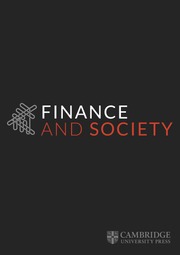No CrossRef data available.
Article contents
Volatile properties: A Modest Proposal revisited
Published online by Cambridge University Press: 09 November 2023
Abstract
In our 2018 film, A Modest Proposal, we proposed to financialize the assets of public museums, their collections, and buildings, and distribute the generated values for the benefit of the producers of those values: the artist community. Reality seems to have caught up with our proposal. In the wake of the pandemic, public museums started to sell NFTs of their master pieces. But this did not inspire any new form of mutualization. In this text, we question whether blockchain infrastructures can be considered a public good. The individualistic logics that pervade the crypto sphere consider human relations in transactional terms and the enforcement of property rights as the only valuable governance principle, defining property as the basis for representation in many of the Decentralized Autonomous Organizations (DAOs). The trust placed in automated processes might lead to ‘governance by algorithms’, making the ‘Leviathan’, the sovereign machine, a frightening possibility. Other blockchain infrastructures may offer more inclusive alternatives. Distributed Cooperative Organizations (DisCOs) acknowledge the need for the individual to sustain her/himself and yet also create a solidarity economy by the mutual distribution of collectively generated values among all contributors. We focus on the above questions on property, public goods and governance using our home in Brussels, which we have defined as an artwork and framing device. It is the ‘house as artwork’ that helps us evaluate how these concepts play out in an accelerating world in which blockchain and other technologies might equally generate emancipation or new enclosures.
- Type
- Artwork (Commentary)
- Information
- Finance and Society , Volume 9 , Issue 3: Volatility in finance, art, and culture , 2023 , pp. 75 - 90
- Creative Commons
- This is an Open Access article, distributed under the terms of the Creative Commons Attribution-NonCommercial-No Derivatives licence (http://creativecommons.org/licenses/by-nc-nd/4.0/), which permits noncommercial re-use, distribution, and reproduction in any medium, provided the original work is unaltered and is properly cited. The written permission of Cambridge University Press must be obtained for commercial re-use or in order to create a derivative work.
- Copyright
- © 2023 The Author(s)




